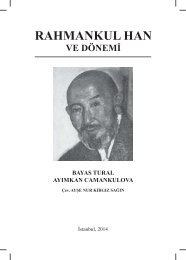THE SOVIET HISTORIOGRAPHY AND THE QUESTION OF KAZAKHSTAN’S HISTORY
SOVYET-TARIH-YAZICILIGI-ENG
SOVYET-TARIH-YAZICILIGI-ENG
Create successful ePaper yourself
Turn your PDF publications into a flip-book with our unique Google optimized e-Paper software.
104<br />
<strong>THE</strong> <strong>SOVIET</strong> <strong>HISTORIOGRAPHY</strong> <strong>AND</strong><br />
buried.” writes Medev Sarseke, in his biography of Bekmakhanov. 160<br />
In 1933, Bekmakhanov enrolled in the Tambov Pedagogy Institute History<br />
Department with a full scholarship from the Ministry of Education.<br />
However, with the closure of the department in 1936, he transferred to<br />
Voronezh Pedagogy Institute and graduated in 1937. In the same year,<br />
he returned to Kazakhstan and initially started as a history teacher at<br />
No. 28 M. Mametova secondary school in Almaty. After that, he worked<br />
at the Research Institute of Kazakhstan Ministry of Education. Within<br />
a short time, he was promoted as an institute principal.<br />
Between 1946 and 1947, he acted as vice-principal of the newly-established<br />
History, Archaeology and Ethnography Institute of the Kazakh<br />
SSR Academy of Sciences. From 1947 until his untimely death – that<br />
is, 6 May 1966 – he acted as the chairman of the history department<br />
of the Kazakh Public University.<br />
Generally, the historians divide his career and rise as a historian<br />
and academic into three periods.<br />
During the first period (1942-1947), he defended his PhD thesis (1943)<br />
and thereafter he became a professor by successfully defending his<br />
docent dissertation, which would later be published as a book titled<br />
“Kazakhstan between 20s and 40s of the 19 th Century”.<br />
The second period (1948-1958) is famous for his downfall and<br />
troubles, most notably the attacks against him and the persecution,<br />
accusations, and exile.<br />
The last period (1958-1966) covers the years when he was re-admitted<br />
to his position, re-claimed his posts, was elected as a standing<br />
member to the Kazakh SSR Academy of Sciences in 1964, produced<br />
several significant works and course books, educated students, and<br />
subsequently fell ill and died. 161<br />
The diaries and memoirs of his contemporaries and students reveal<br />
his curiosity about the arts and sciences, his fondness of friendship<br />
and fraternity, his love for his family and country, and his devotion<br />
to moral principles and national values.<br />
Now we can concentrate on the content of the presentation. Bekmakhanov’s<br />
100 th anniversary of his birth coincides with the activities<br />
commemorating the 550 th anniversary of Kazakh Khanate, which was celebrated<br />
nationwide by the proposal of Kazakhstan’s President Nursultan<br />
Nazarbayev. Bekmakhanov’s expertise on topics such as the rebellion of<br />
Kenessary Kasymoglu Khan and the Kazakh Khanate’s rise as an indepen-<br />
160 Medev, Sarseke, Ermukhan Bekmakhanov, 2010.<br />
161 Takenov. A.S., Ermukhan Bekmakhanoviç Bekmakhanov, V. Knige Korjihina. T. P., Senin.<br />
A. S., İstorya Rossiyskoy Gosudarstvennosti, Moscow, 1995, pp. 10-14.



